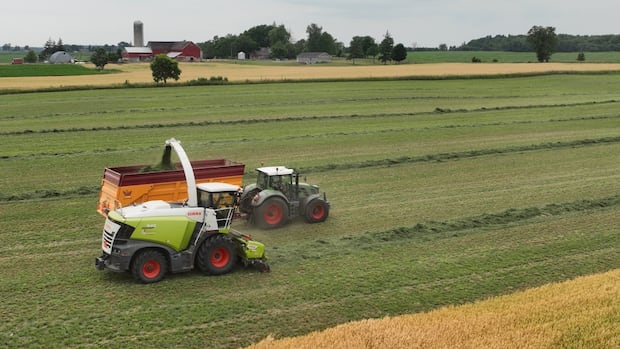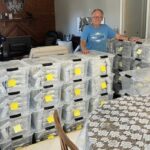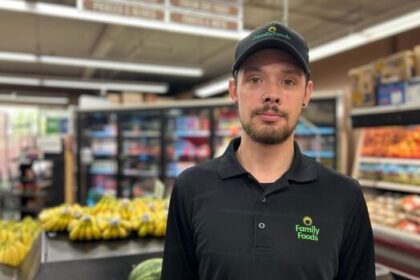SaskatchewanTwo experts say more companies will move production to other countries in order to have a stable business relationship rather than dealing with tariff uncertainty.Western Canada core market for CLAAS combines Alexander Quon · CBC News · Posted: Sep 26, 2025 6:00 AM EDT | Last Updated: 5 hours agoCLAAS is moving the production of its Canadian-bound products from its facility in Omaha, Neb., to Germany. (Patrick Morrell/CBC)A combine manufacturer whose primary customers are farmers in Western Canada has confirmed it is moving production of some of its heavy machinery out of the United States and into Germany to avoid tariff uncertainty. CLAAS has typically produced its North American machinery at its plant in Omaha, Neb. But for the 2026 model year, CLAAS is moving the assembly of its Canada-bound products — all its LEXION 8000 Series machines — to its facility in Harsewinkel, Germany. “This production allocation is a strategic response to the current tariff and trade framework — in particular existing U.S. customs duties — helping to keep prices competitive for farmers,” the company wrote in a statement to CBC News this week. CLAAS declined to provide any sales data but said its primary market in North Market is farmers in Alberta, Saskatchewan, Manitoba and, to a smaller extent, producers in Eastern Canada.The decision will not result in layoffs at its Nebraska facility, CLAAS said. The factory will instead focus on assembly for the U.S. market.Two experts say the decision is not necessarily about the current state of trade between Canada and the United States. Instead, it’s about looking forward and planning for what will likely be a contentious renegotiation of the Canada-U.S.-Mexico Agreement on trade (CUSMA). William Huggins, an assistant professor of finance and business economics at McMaster University, said the current trade dispute between Canada and the United States has been fought with their “gloves on.” Many products are exempt under CUSMA, but that could change if and when renegotiation begins, he said. “It can get a lot messier and it can get a lot more difficult, economically speaking,” Huggins said. “We should expect to see businesses behaving cautiously.”WATCH | Canada, Mexico agree to deepen trade ties: Canada, Mexico agree to deepen trade ties | Hanomansing TonightPrime Minister Mark Carney and Mexican President Claudia Sheinbaum agreed to deepen ties between their two countries, not just by preserving the Canada-U.S.-Mexico Agreement but by striking what’s being billed as a ‘comprehensive strategic partnership.’Canada has a free trade agreement with Germany through the European Union.It’s not up for renegotiation and that ensures companies like CLAAS will have stability, said Colin Mang, an economist at McMaster University. Mang said CLAAS is likely one of the first companies to make this kind of decision, and he expects more to follow.”You’re going to see more companies over the next few months start to announce changes to their supply chains and changes to their manufacturing processes to get ahead of potential tariffs that could come in next year,” said Mang. Companies almost always have long-term plans, especially when it can cost millions of dollars to invest in production facilities, both experts said. It’s why stability is so highly sought after by large multinational companies. “Having certainty in terms of tariff-free access, that goes a long way to forecasting what their business will look like over the coming decades,” said Mang. ‘A significant investment’For farmers, the purchase of a new combine is significant expense.Jeremy Welter, a vice president with the Agricultural Producers Association of Saskatchewan, estimated the average price for a new machine can easily reach more than $1 million, and that doesn’t include other potential tools like a header that a farmer might need. Welter, whose farm is located northeast of Kerrobert, Sask., said it’s an important purchase because a combine is a necessary tool during harvest season. “When you’re talking about that much money for a piece of machinery that you are realistically going to use, you know, six, maybe seven, weeks a year, it’s a significant investment,” said Welter. Welter said the shift in production by CLAAS is a “good business decisions” that could mean a cheaper cost for farmers in Western Canada.Huggins said it might appear easier to transport machinery across the border, but it’s ultimately about a business’s bottom line. “If it’s cheaper to send across an ocean rather than send it across a heavily tariffed border, that’s what they’ll do,” said Huggins. ABOUT THE AUTHORAlexander Quon is the provincial affairs reporter for CBC Saskatchewan. He has been a reporter with CBC Saskatchewan since 2021 and is happy to be working in his hometown of Regina after half a decade in Atlantic Canada. He has previously worked with the CBC News investigative unit in Nova Scotia and Global News in Halifax. Alexander specializes in freedom of information requests and data reporting. He can be reached at: alexander.quon@cbc.ca. FacebookTwitter
As combine manufacturer shifts production to Europe from U.S., experts say tariffs mean more may follow











